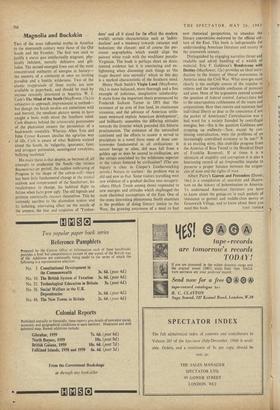Magnolia and Buckskin
Two of the most influential myths in America in the nineteenth century were those of the Old South and the Frontier. The first was used to justify a status quo intellectually stagnant. phy- sically indolent, morally defensive and gilt- laden. The second emerged from one of the most concentrated outbursts of energies in history- the mastery of a continent at once an inviting paradise and a hostile wilderness. Two of the classic reappraisals of these myths are now available in paperback, and should be read by anyone remotely interested in America. W. J. Cash's The Mind of the South (Mayflower, I 2s.). is subjective in approach, impressionist in method- but though the brush strokes are sometimes wild and hurried, the resultant picture seems to have caught a basic truth about the Southern mind. Cash discerns behind the aristocratic pretensions of the plantation owners the persistence of a backwoods mentality. Whereas Allen Tate and John Crowe Ransom idealise the agrarian way of life, Cash is aware of what Baldwin noticed about the South. its 'vulgarity, ignorance, fussy and arrogant pretension, unmitigated rowdyism, bullying insolence.'
His main thesis is that despite, or because of, all attempts to modernise the South-the vicious Reconstruction period, the sudden embracing of Progress in the shape of the cotton-mill-there has been little fundamental change in the mental outlook and temperament of the Southerner, his recalcitrance to change, his habitual flight to fiction when facts grow ugly. The old legends and patterns continually reassert themselves. This he variously ascribes to the plantation system and its isolating, enervating effect on the minds of the owners; the fear and suspicion of 'Yankee-
dom' and all it stood for (in effect the modern world); certain characteristics such as 'indivi- dualism', and a tendency towards romance and hedonism; the climate; and of course the per- sistent negrophobia which would align the poorest white trash with the wealthiest pseudo- Virginian. The book is perhaps short on docu- mented evidence but it is convincing and en- lightening when discussing such things as 'the tragic descent into unreality' which to this day is a marked characteristic of the Southern mind.
Henry Nash Smith's Virgin Land (Mayflower, 10s.) is more balanced, more thorough and a fine example of judicious, imaginative scholarship. It starts from the important thesis pronounced by Frederick Jackson Turner in 1893 that 'the existence of an area of free land, its continuous recession, and the advance of American settle- ment westward explain American development'; and brilliantly assembles the differing attitudes towards the frontier which preceded this historic proclamation. The existence of the untouched continent and the efforts to master it served to precipitate in a novel form some of those con- troversies fundamental in all civilisations: is nature benign or alien, did man fall from a golden age or does he ascend to civilisation, are the virtues nourished by the wilderness superior to the values fostered by civilisation? (The am- biguity is clear in Cooper's Leatherstocking novels.) Nature or nurture: the problem was as old and new as that. Some visitors travelling west saw evidence of a gradual decline into savagery: others (Mark Twain among them) responded to new energies and attitudes which challenged the most cherished assumptions of the East. One of the more interesting phenomena Smith examines is the problem of doing literary justice to the West, the growing awareness of a need to find
new rhetorical perspectives, to abandon the literary conventions endorsed by the official cul- ture of the East. This book is indispensable for understanding American literature and society in the nineteenth century.
Distinguished by engaging narrative thrust and readable and adroit handling of a wealth of
material, Eric F. Goldman's Rendezvous with Destiny (Mayflower, 12s.) provides an ideal intro- duction to the history of liberal movements in
America since the Civil War. What emerges most clearly is the multiple source of the impulse to
reform and the inevitable confusion of premises ti• and aims. Most of the arguments centred around the question of federal control. Laissez-faire led to the unscrupulous ruthlessness of the trusts and corporations. How then restore and maintain that individual liberty so dear to the conscience if not the pocket of Americans? Centralisation was a bad word for a society founded by centrifugal energies, but--this is the question Goldman sees cropping up endlessly-'how, except by con- tinuing centralisation, were the problems of an increasingly centralised economy to be met?' It is an exciting story, this crab-like progress from the America of Boss Tweed to the Hundred Days of Franklin Roosevelt. If at times it is a chronicle of stupidity and corruption it is also a heartening record of an irrepressible impulse to preserve a proper balance between the exigen- cies of state and the rights of man.
Albert Parry's Garrets and Pretenders (Dover, 16s.) is a compilation of anecdote and illustra- tion on the history of bohemianism in America. To understand American literature you have to know about the goings-on in such pockets of resistance to genteel and middle-class mores as Greenwich Village, and to know about them you need this book. TONY TANNER














































 Previous page
Previous page